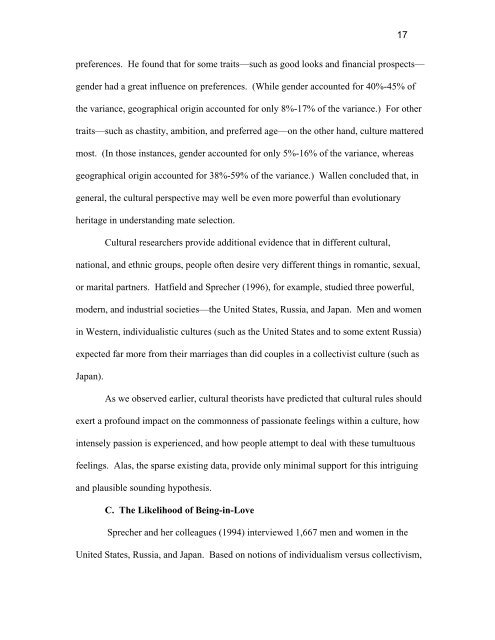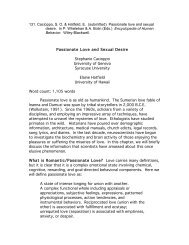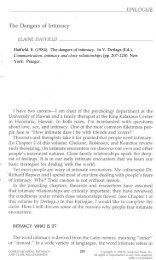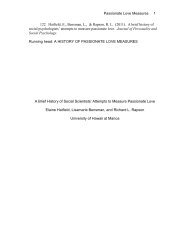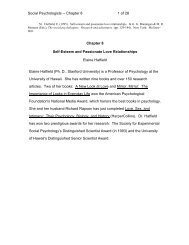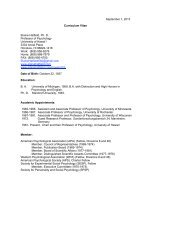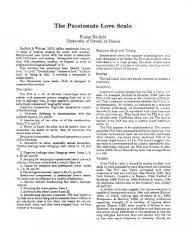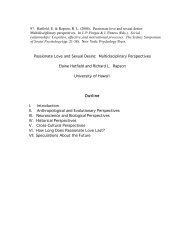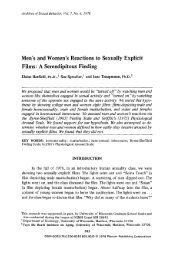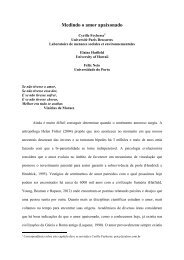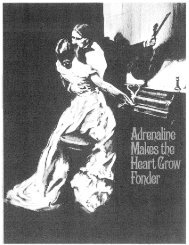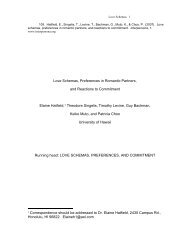16Since Darwin’s (1871) classic treatise on The Descent of Man, evolutionarytheorists have been interested in mate preferences. Many evolutionary psychologistscontend that there are cultural universals in what men <strong>and</strong> women desire in a mate.This contention is supported by a l<strong>and</strong>mark cross-cultural study conducted byBuss (1994). Buss asked over 10,000 men <strong>and</strong> women from 37 countries, to indicatewhat characteristics they sought in potential mates. These people came from a variety ofgeographic, cultural, political, ethnic, religious, racial, economic, <strong>and</strong> linguistic groups.Buss <strong>and</strong> his colleagues found that, overall, the single trait that men <strong>and</strong> women in allsocieties valued most was “mutual attraction-love.” After that, men <strong>and</strong> women carednext about finding someone who possessed a dependable character, emotional stability<strong>and</strong> maturity, <strong>and</strong> a pleasing disposition. Men tended to care more about the physicalappearance <strong>and</strong> youth of their partners than did women; women tended to be moreinsistent that their mates possess high status <strong>and</strong> the resources necessary to protectthemselves <strong>and</strong> their children than did men.Buss was interested in cultural <strong>and</strong> gender universals; nonetheless, he could nothelp but be struck by the powerful impact that culture had on other mentionedpreferences. In China, India, Indonesia, Iran, Israel (the Palestinian Arabs), <strong>and</strong> Taiwan,for example, young people were insistent that their mate should be “chaste.” In Finl<strong>and</strong>,France, Norway, the Netherl<strong>and</strong>s, Sweden, <strong>and</strong> West Germany, on the other h<strong>and</strong>, mostjudged chastity to be relatively unimportant. A few respondents even jotted notes in themargin of the questionnaire, indicating that, for them, chastity would be a disadvantage.In an alternative analysis of Buss’s (1994) data, Wallen (1989) attempted todetermine which was the most important—culture or gender—in shaping people’s mate
17preferences. He found that for some traits—such as good looks <strong>and</strong> financial prospects—gender had a great influence on preferences. (While gender accounted for 40%-45% ofthe variance, geographical origin accounted for only 8%-17% of the variance.) For othertraits—such as chastity, ambition, <strong>and</strong> preferred age—on the other h<strong>and</strong>, culture matteredmost. (In those instances, gender accounted for only 5%-16% of the variance, whereasgeographical origin accounted for 38%-59% of the variance.) Wallen concluded that, ingeneral, the cultural perspective may well be even more powerful than evolutionaryheritage in underst<strong>and</strong>ing mate selection.Cultural researchers provide additional evidence that in different cultural,national, <strong>and</strong> ethnic groups, people often desire very different things in romantic, sexual,or marital partners. <strong>Hatfield</strong> <strong>and</strong> Sprecher (1996), for example, studied three powerful,modern, <strong>and</strong> industrial societies—the United States, Russia, <strong>and</strong> Japan. Men <strong>and</strong> womenin Western, individualistic cultures (such as the United States <strong>and</strong> to some extent Russia)expected far more from their marriages than did couples in a collectivist culture (such asJapan).As we observed earlier, cultural theorists have predicted that cultural rules shouldexert a profound impact on the commonness of passionate feelings within a culture, howintensely passion is experienced, <strong>and</strong> how people attempt to deal with these tumultuousfeelings. Alas, the sparse existing data, provide only minimal support for this intriguing<strong>and</strong> plausible sounding hypothesis.C. The Likelihood of Being-in-<strong>Love</strong>Sprecher <strong>and</strong> her colleagues (1994) interviewed 1,667 men <strong>and</strong> women in theUnited States, Russia, <strong>and</strong> Japan. Based on notions of individualism versus collectivism,
- Page 1 and 2: 78. Hatfield, E., Rapson, R. L.. &
- Page 3 and 4: 3of neural activation (see Bartels
- Page 5 and 6: 5After observing many kinds of prim
- Page 7 and 8: 7someone, there is less need to ass
- Page 9 and 10: 9mutability of human behavior. They
- Page 11 and 12: 11evidenced in the availability of
- Page 13 and 14: 13Chu (1985; Chu & Ju, 1993), too,
- Page 15: 15To test the notion that passionat
- Page 19 and 20: 19. . . everybody knows that love c
- Page 21 and 22: 211980). Families might also consul
- Page 23 and 24: 23fact they do not. Joseph and Jose
- Page 25 and 26: 25To test this notion, Sprecher and
- Page 28 and 29: 28jealousy's pangs. She observed:
- Page 30 and 31: 30cuckold should fail to detect the
- Page 32 and 33: 32sure, but stories none-the-less.
- Page 34 and 35: 34The Toda of Southern India, who w
- Page 36 and 37: 36extreme jealousy) and the Toda tr
- Page 38 and 39: 38women were “supposed” to resp
- Page 40 and 41: 40This treatment of an unfaithful w
- Page 42 and 43: 42Naturally, cultural differences s
- Page 44 and 45: 44Bringle, R. G., & Buunk, B. (1986
- Page 46 and 47: 46Dion, K. K. & Dion, K. L. (1993).
- Page 48 and 49: 48Hatfield, E. & Rapson, R. L. (198
- Page 50 and 51: 50Kitayama, S. (2002.) Culture and
- Page 52 and 53: 52Prakasa, V. V., & Rao, V. N. (197
- Page 54 and 55: 54Sternberg, R. J. (1988). Triangul


